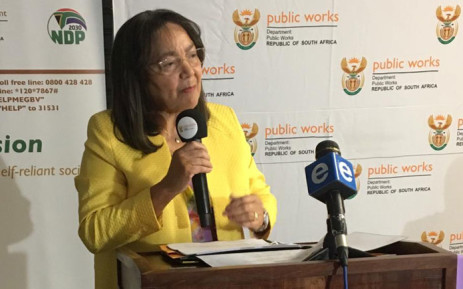
Mantashe warns mines over COVID-19 compliance, Nxesi worried about worker safety
Economic cluster ministers in the national coronavirus command council are briefing the media on the level 3 lockdown regulations pertaining to their departments.
by Eyewitness NewsPRETORIA - Economic cluster ministers in the national coronavirus command council are briefing the media on the level 3 lockdown regulations pertaining to their departments.
Minister of Public Works and Infrastructure Patricia de Lille said there were enough quarantine sites to cater to South Africans who needed to be quarantined due to the coronavirus.
De Lille said her department had identified 1,752 quarantine facilities, which represented 129,600 beds across the country to cater for the expected rise in COVID-19 infections in the country.
She said in the Western Cape, which is the epicentre of coronavirus infections, there were 358 facilities, with 27,500 beds.
Under the disaster management, the role of the Public Works Department is to identify and make available quarantine sites in all 44 districts and 8 metropolitan areas, which will later be assessed and confirmed by the Department of Health.
De Lille said her department had approached the private sector and the hospitality industry to avail some of their facilities as possible quarantine sites.
COMPLIANCE IN THE MINING INDUSTRY
Mineral Resources Minister Gwede Mantashe on Friday said mines who failed to comply with regulations and measures to curb the spread of the coronavirus would be committing a criminal act.
This as mines in Limpopo, Gauteng and the North West have recorded infections since the return of workers under level 4 – where mines worked at 50% capacity.
Mantashe said, under level 3 all deep mine operations expected to ramp-up to full capacity bringing the industry to full operation.
‘Prior to ramping up, all mining operations are required to prepare and implement a mandatory code of practice for the management of COVID-19. Failure to do so will be regarded as a criminal offence and a breach of the Mining Safety Act.”
'EMPLOYERS NEED TO DO MORE TO ENSURE WORKPLACES ARE SAFE’
Labour Minister Thulas Nxesi said employers needed to do more to ensure the safety of employees.
He said compliance with health and safety measures to stop the spread of COVID-19 in the workplace left much to be desired.
“Inspections conducted on Monday, this week, on 72 workplaces, 44 of them were not compliant and six prohibition notices, 37 contraventions and six improvement notices just on the one day.”
The minister said in the period of 30 March to 30 May 2020, 332 prohibitions notices, an average of 9 such notices per day, had been issued.
Nxesi said of the 3,844 inspections conducted, 1,724 failed to comply.
Employers needed to make sure the right number of workers returned and cleanliness and hygiene were prioritised.
“We would expect every employer to jump at the opportunity of saving their company by protecting their key asset, and that is their workers.”
He said inspections would continue to be conducted in the public and private sector.
The Labour Minister said since the start of the lockdown, the Unemployment Insurance Fund (UIF) had paid out R15 billion in COVID-19 to three million workers and committed a total of R17 billion.
He said the UIF was now processing May applications, which had been delayed by two days.
Nxesi said his department believed the move to alert level 3 would be eased by the return of many to their places of employment.
At the same time, the minister said his department had received 116 claims to the compensation fund for contracting COVID-19 on duty and it had accepted liability of 108.
He said 83% of the claims came from healthcare practitioners.
LOCAL MASK PRODUCTION
At the same time, Trade and Industry Minister Ebrahim Patel said 31 million masks for healthcare workers would be produced locally by the end of June.
Patel said before April a project to begin the local production of ventilators was started.
“We are now working to get three prototypes finalised and after we have, production will start in June.”
He said by August the initial target of 20,000 ventilators would have been reached.
Patel said the importation of medical equipment was continuing.
WATCH: Economic cluster ministers brief media on level 3 regulations